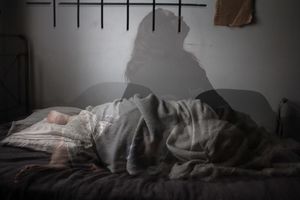Sleep Disorders In Stroke
Original Editor - Candace Goh
Top Contributors - Candace Goh
Introduction[edit | edit source]
Sleep disorders represent a common yet often overlooked aspect of stroke care, significantly impacting an individual's physical and cognitive well-being. In stroke rehabilitation, understanding and addressing sleep disorders are crucial for optimising recovery outcomes. Sleep disorders serve significant functions as both a risk element and a determinant in the recovery and prognosis of stroke.[1]
Prevalence of Sleep Disorders in Stroke[edit | edit source]
Sleep disturbances are highly prevalent among stroke survivors, with studies reporting rates ranging from 40% to 72%.[2][3] Females have a higher risk compared to males, as do those with higher stroke severity. Common sleep disorders observed in this population include insomnia, obstructive sleep apnea (OSA), restless legs syndrome (RLS), and sleep-related movement disorders.[4] The presence of these disorders not only affects sleep quality but also exacerbates stroke-related impairments and complicates the rehabilitation process.
Underlying Mechanism[edit | edit source]
- Impact on Stroke Pathophysiology: Sleep disorders, particularly OSA, exert detrimental effects on cerebrovascular health, contributing to endothelial dysfunction, inflammation, and oxidative stress—key factors implicated in stroke pathophysiology.[5] Moreover, sleep disturbances disrupt cerebral autoregulation, exacerbate hypoperfusion in ischemic areas, and compromise neuronal repair mechanisms following stroke.[6]
- Neuroplasticity and Recovery: Adequate sleep is essential for neuroplasticity, the brain's ability to reorganise and form new connections in response to injury. Disrupted sleep architecture and alterations in sleep-wake cycles impede neuroplastic processes, hinder motor learning, and compromise functional recovery in stroke survivors.[7]
Clinical Assessment and Diagnosis[edit | edit source]
Effective management of sleep disorders in stroke rehabilitation begins with comprehensive clinical assessment and accurate diagnosis. Physiotherapists play a pivotal role in recognising and addressing sleep disturbances within the scope of their practice. Key considerations include:
- Conducting thorough sleep history assessments to identify symptoms suggestive of underlying sleep disorders.
- Collaborating with sleep medicine specialists and other healthcare professionals to facilitate timely diagnosis through polysomnography (PSG) and other sleep studies.[8] PSG remains the gold standard for diagnosing sleep disorders; however, simplified screening tools like the STOP-BANG questionnaire for OSA and validated insomnia severity scales can assist in prioritising patients for further evaluation.[9]
- Utilising validated screening tools, such as the Epworth Sleepiness Scale (ESS) and the Pittsburgh Sleep Quality Index (PSQI), to evaluate sleep quality and daytime sleepiness.[10][4]
Therapeutic Interventions[edit | edit source]
Integrating sleep-focused interventions into stroke rehabilitation programs can enhance treatment efficacy and promote optimal recovery outcomes. Physiotherapy interventions that address sleep disorders may include:
- Complementing structured exercise programs tailored to improve sleep quality and promote relaxation, incorporating aerobic exercise, strength training, and flexibility exercises.[11]
- Providing education on sleep hygiene principles, including the importance of maintaining a consistent sleep schedule, creating a conducive sleep environment, and avoiding stimulants before bedtime.[12]
- Collaborating with interdisciplinary teams to coordinate pharmacological interventions, cognitive-behavioural therapy for insomnia, and continuous positive airway pressure (CPAP) therapy for OSA.[4][13]
Resources[edit | edit source]
References[edit | edit source]
- ↑ Hermann DM, Bassetti CL. Role of sleep-disordered breathing and sleep-wake disturbances for stroke and stroke recovery. Neurology. 2016 Sep 27;87(13):1407-16.
- ↑ Mohandas P, Alomari Z, Arti FN, Alhneif M, Ruiz PA, Ahmed AK, Wei CR, Amin A, Kukreja A, Alrahahleh AA. A Systematic Review and Meta-Analysis on the Identification of Predictors Associated With Insomnia or Sleep Disturbance in Post-stroke Patients. Cureus. 2024 Mar 20;16(3).
- ↑ Hasan F, Gordon C, Wu D, Huang HC, Yuliana LT, Susatia B, Marta OF, Chiu HY. Dynamic prevalence of sleep disorders following stroke or transient ischemic attack. Stroke. 2021.
- ↑ 4.0 4.1 4.2 Cai H, Wang XP, Yang GY. Sleep Disorders in Stroke: An Update on Management. Aging and disease. 2021;12(2):570.
- ↑ Gonzalez-Aquines A, Martinez-Roque D, Chavez-Luevanos BE, Guerrero-Campos F, Gongora-Rivera F. Obstructive sleep apnea syndrome and its relationship with ischaemic stroke. Revista de Neurologia. 2019 Sep 1;69(6):255-60.
- ↑ Baillieul S, Dekkers M, Brill AK, Schmidt MH, Detante O, Pépin JL, Tamisier R, Bassetti CL. Sleep apnoea and ischaemic stroke: current knowledge and future directions. The Lancet Neurology. 2022 Jan 1;21(1):78-88.
- ↑ Mensen A, Pigorini A, Facchin L, Schöne C, D'Ambrosio S, Jendoubi J, Jaramillo V, Chiffi K, Eberhard-Moscicka AK, Sarasso S, Adamantidis A. Sleep as a model to understand neuroplasticity and recovery after stroke: observational, perturbational and interventional approaches. Journal of neuroscience methods. 2019 Feb 1;313:37-43.
- ↑ Baglioni C, Nissen C, Schweinoch A, Riemann D, Spiegelhalder K, Berger M, Weiller C, Sterr A. Polysomnographic characteristics of sleep in stroke: a systematic review and meta-analysis. PLoS One. 2016 Mar 7;11(3):e0148496.
- ↑ Nagappa M, Liao P, Wong J, Auckley D, Ramachandran SK, Memtsoudis S, Mokhlesi B, Chung F. Validation of the STOP-Bang questionnaire as a screening tool for obstructive sleep apnea among different populations: a systematic review and meta-analysis. PloS one. 2015 Dec 14;10(12):e0143697.
- ↑ Lapin BR, Bena JF, Walia HK, Moul DE. The Epworth Sleepiness Scale: validation of one-dimensional factor structure in a large clinical sample. Journal of Clinical Sleep Medicine. 2018 Aug 15;14(8):1293-301.
- ↑ Zhang Q, Liu Y, Liang Y, Yang D, Zhang W, Zou L, Wan Z. Exercise intervention for sleep disorders after stroke: A protocol for systematic review and meta-analysis. Medicine. 2021 Apr 30;100(17):e25730.
- ↑ Dharmakulaseelan L, Kirolos N, Kamra M, Armesto-Heys A, Bouthillier C, Runions S, Linkewich E, Murray BJ, Boulos MI. Educating stroke/TIA patients about obstructive sleep apnea after stroke: a randomized feasibility study. Journal of Stroke and Cerebrovascular Diseases. 2019 Nov 1;28(11):104317.
- ↑ Yang Y, Wu W, Huang H, Wu H, Huang J, Li L, Wang L. Effect of CPAP on cognitive function in stroke patients with obstructive sleep apnoea: a meta-analysis of randomised controlled trials. BMJ open. 2023 Jan 1;13(1):e060166.







